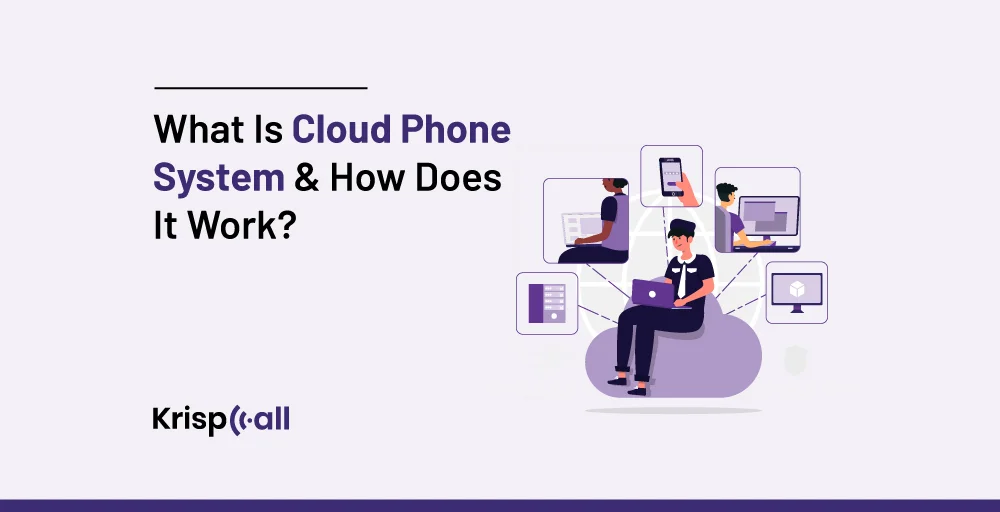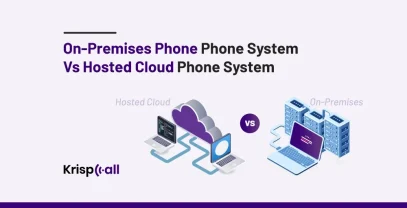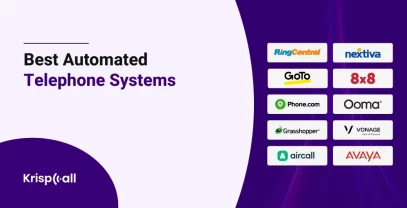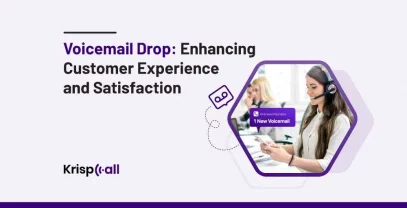Did you know that, according to Statista, the telephony market worldwide generated a revenue of US $486.7 billion?
With all the numbers speaking a different story, many business organizations are held back by handling complex and inefficient telephone solutions, which often hinder their productivity and costs a lot.
Is there a way to deal with that? There’s one solution: a Cloud Phone System. This technology manages your communication network by providing efficient connectivity, better functionality, and reduced expenditure.
In this blog, we will discuss more about what a cloud phone system is and how it works. Moreover, we will also discuss its benefits and features for all business sizes. 🎉
🔑 KEY HIGHLIGHTS
- A cloud phone system is a Voice over Internet Protocol (VoIP) system that is hosted and managed by a service provider in the cloud rather than on-premises hardware.
- A cloud phone system provides your business with great features such as virtual phone numbers, automated attendants, and CRM integration.
- Cloud telephony system offers many benefits such as scalability, easy management, mobility, flexibility, reliability and redundancy, and more.
- KripsCall is the best cloud phone system and offers many advanced features like auto attendants, call forwarding, call recording, IVR, call queuing, voicemail transcription, and so on.
What is a Cloud Phone System?
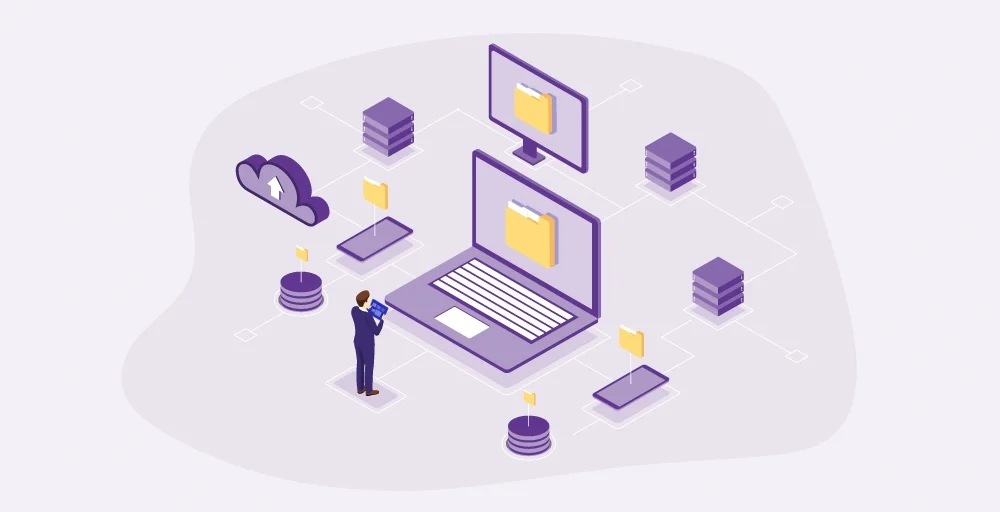
A cloud phone system is a Voice over Internet Protocol (VoIP) system that is hosted and managed by a service provider in the cloud, rather than on-premises hardware. This allows businesses and individuals to make inbound and outbound calls over the Internet using many devices. It can be used via softphones, IP phones, and mobile devices.
A cloud phone system is one of the modern, scalable, and flexible solutions that offers many advanced features and mobility. They are more affordable and much more adaptable as compared to on-premise PBX systems, especially for SMEs.
What is a Cloud Phone System Used for?
A cloud phone system is mainly used to facilitate and improve business communications through internet telephony. This system offers voice calls, video, voice conferencing, and messaging using VoIP technology. Furthermore, a cloud phone service provides flexibility that enables employees to work together regardless of their geographical location.
Additionally, as of 2024, most businesses tend to use cloud phone systems for their communication needs to enhance mobility and work-from-home options. Cloud phone systems are also used to cut costs since they do not require extensive hardware installations and have standardized, per-user pricing.
Moreover, this system offers advanced features and functions like auto attendant, call transfer, voicemail to email, and integration with other business tools and customer relationship management (CRM) software that enhances customer support and organizational productivity.
How Does Cloud Phone System Work?
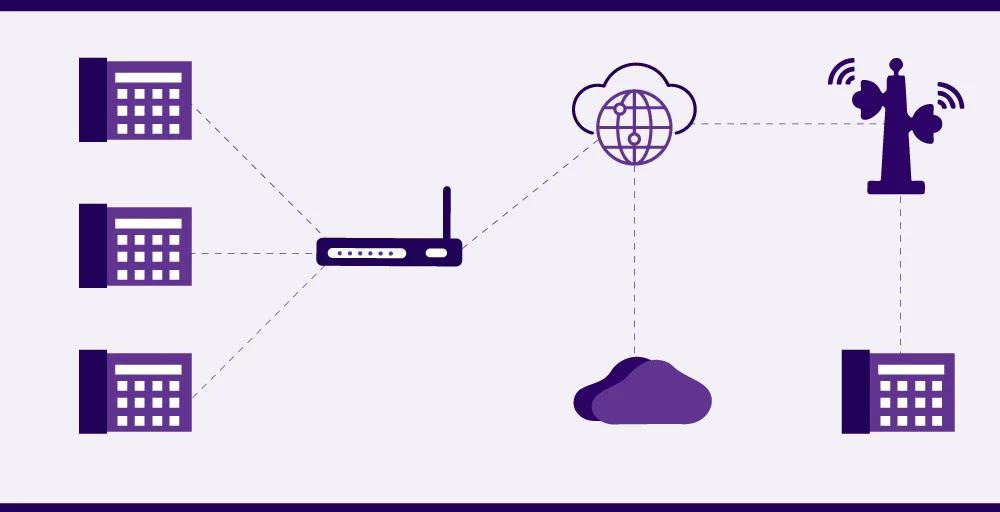
A cloud phone system usually works by using the Internet to transmit voice calls. This process is also known as Voice over Internet Protocol (VoIP). When you initiate a call from a VoIP-enabled device, then the call is converted into digital data packets. These packets contain voice information traveling over the Internet through various routers and switches until they reach the intended recipients.
On the recipient’s end, the digital data packets are converted back into analog signals by an Analog Telephone Adapter (ATA) also known as a VoIP adapter. So, after this, signals are converted into audible waves on the recipient’s phone. As a result, they can hear the caller’s voice.
Overall, this smooth voice-data packet exchange makes two-way communication as real-time as possible, lasting until one of the parties ends the conversation.
Features Cloud Phone System Must Have
Running a smooth business communication operation requires a cloud-based phone system that contains essential features. Having all of those not only helps businesses meet their communication needs but also provides flexibility and reliability.
Here are some features of cloud phone systems that a cloud phone system must have in business to increase productivity.
- Auto Attendant: This feature allows you to automatically transfer your incoming calls to the relevant department. As a result, it helps to improve your customer experience (CX) and reduce call handling time.
- Call recording: A call recording is a tool that allows users to record phone calls and save them for later playback or study. It is crucial for organizations that are looking to improve their customer service.
- Integration with business tools: Integration with business tools allows you to centralize your communication using a single platform. Through this, you can organize your workflows and improve productivity.
- Call forwarding: Call forwarding feature allows you to forward your inbound calls to another phone extensions. It makes sure that all your calls are directed to your respective departments, ensuring seamless communication and minimizing disruptions.
- Call Analytics: Through call analytics, you can get proper reporting on call metrics. For instance, it includes volume, durations, and sales patterns. As a result, it helps your businesses facilitate their communication plans.
Benefits of Cloud Phone System
Utilizing a cloud telephony system can offer you various benefits. Some of them are explained below.
1. Cost -Effectiveness
The cloud phone system eliminates the potential cost of expensive upfront hardware purchases, such as servers and phone switches. So, as a result, businesses can reduce a significant amount of expenses.
Additionally, as these systems offer a flexible pay-as-you-go model, you can only pay for the features and services that your company utilizes. So, through this, you can be sure that it helps to save the costs associated with traditional phone systems and avoid unnecessary expenses.
2. Scalability
For enterprise cloud phone systems, it is crucial to have a system that is highly scalable. For instance, if you are hosting a marketing campaign, then you might need to add the users since there will be a high flow of calls. So, whether scaling up or down, cloud systems provide the needed scalability options without the hassle of physical infrastructure upgrades.
3. Mobility and Flexibility
With cloud phone systems, your team members can make and receive business calls from any location with an internet connection using various devices like computers, tablets, or smartphones. This is perfect for companies that have personnel who travel regularly and for remote workers.
4. Reliability
Cloud phone systems are stored in well-protected and well-equipped data centers with backup facilities all over the place to make sure that this system is as reliable as possible. However, even in the event of a power outage, hardware failure, or any other issue, the calls can still be rerouted to other systems.
5. Easy Management
Cloud phone systems are usually accessed through a web portal where an administrator can modify various aspects of the system, assign users, and analyze call traffic in real-time. This means that this centralized management makes it easy to manage, and it also reduces the amount of work for the IT department.
How Much is a Cloud Phone System?
The most basic packages of cloud phone systems cost as low as $10 to $20 per user per month and come with basic call forwarding, voicemail, and basic conferencing capabilities.
Additionally, the more sophisticated tiers, including auto-attendants, call recording, and integration with other business applications, may cost between $20 and $40 per user per month.
For premium features such as CRM integration or analytics or for global calling facilities, costs may even go up to $40-$100 per user per month for larger enterprises or those needing these facilities.
Since the cost of a cloud phone system will differ depending on the provider and the options available. This varies from the number of people who will use the system and any other additional features that may need to be added.
Nevertheless, you should always consider your particular needs and analyze the differences between the prices and functions offered by various providers to see which option will suit you best. Also, some providers may sell their services cheaper if the client agrees to a yearly subscription or purchases a package deal.
How to Get a Cloud Phone System?
A cloud phone is a one-of-a-kind system that helps to enhance your business communications significantly. Since there are many things to consider before getting the cloud phone system, the following are some of the most important things to consider:
1. Assess Your Business Needs
This is the first and foremost step is you should figure out your business’s requirements. To do this, you should thoroughly identify the number of users, expected call volume, and essential features.
Additionally, make sure that the system can integrate with your existing software. This includes CRM, email, or other business tools or not.
2. Research and Compare Provider
You should research and make a list of different providers and compare their features, pricing models, contract terms, and customer reviews. You can also ask for a demo from the provider of your choice to see the system in action and ask specific questions about their capabilities.
3. Check Security and Compliance
You should also look for a secure cloud phone system to make sure your data is adequately protected. Also, check whether the system complies with necessary legal standards or not. For example, GDPR or HIPAA.
4. Select a provider and sign up
Following that, choose the provider that best meets your needs and offers the best value for your business. However, before signing, you should carefully read the terms and conditions. Moreover, confirm if there is a service level agreement (SLA) or not.
5. Monitor and Optimize
By considering all these steps, lastly, you should regularly monitor the system performance and user feedback. You can also adjust settings and configurations as it is needed to improve efficiency and performance.
Possible Drawbacks of Cloud Phone System
Despite having many pros, there are some possible drawbacks of cloud systems. Here are some of them:
1. Dependence on Internet Connectivity
Cloud phone systems are heavily dependent on the internet connection. Any disruption in the internet service is capable of interrupting phone communication. Additionally, with a poor internet connection, some cloud phone system features, such as video calling, may not work well or at all.
2. Quality of Service (QoS) Issues
Internet bandwidth and the number of connected participants may affect the quality of the call. If not well managed, users may encounter issues such as delay, variation in delay, or inability to get through a call.
3. Compatibility Issues
There are several challenges that a business may face when it comes to integrating a cloud phone system with other existing hardware and software. It is also important to note that some legacy systems may not be fully compatible with new systems, and hence, there will be a need to invest in new equipment or software.
4. Security Concerns
Cloud phone systems are open to risks like hacking, phishing, and data breaches that can easily compromise the entire system. Since the provider will be accessing sensitive business information and therefore, they should employ proper security measures.
How to Choose the Right Cloud Phone System?
If you are trying to get a cloud phone system, then here are some points to consider such as:
1. Service Quality and Proven Reliability
The cloud phone system must be reliable, and uptime must be high. It’s important to have redundant data centers with your cloud telephony service. The best features and most affordable prices don’t matter if your phone doesn’t work.
For an unbiased opinion of each provider’s reliability, you can also check social media sites such as Twitter and Facebook. As a bonus, you should ensure that your provider offers 24/7 network monitoring in order to catch problems before they negatively impact your business.
2. Security and industry compliance
After selecting the cloud telephony provider, it is next important to ensure that it meets industry standards. You should look for the following certifications:
- Healthcare providers need voice and fax services that comply with HIPAA.
- Security threat response standard ISO/IEC 20071.
- Ensure PCI compliance by handling credit card payments securely.
- Protect your privacy and data integrity with SOC 2 compliance.
Additionally, check to see if your chosen provider provides call encryption. Secure Real-time Transport Protocol (SRTP) and Transport Layer Security (TLS) can be applied to encrypted calls to establish high levels of security.
3. Features and Integrations
When considering cloud telephony features, these are just a few questions to ask. You should discuss your business needs with prospective service providers.
These include: Do you need the ability to forward calls to another number, such as a voicemail box or mobile phone? Do you want an automated system to greet callers and direct them to the appropriate extension? How easy is the phone system to use for both you and your employees?
Your employees’ existing routines and workflows will also need to be taken into consideration when setting up a new phone system.
Does your project management software need to be integrated with your phone system? How about your CRM? Are your phone system configurations easy to implement and maintain? As you consider prospective service providers, think about these questions.
4. The True Cost of Ownership
Since prices often appear attractive on paper. Upon starting the service, you get an unpleasant bill that looks nothing like you expected.
Be sure your pricing is transparent, so you know what’s included and what you’ll need to pay extra for. Make sure you know the pricing details, like:
- How many users do you have?
- Payment plans (and discounts), if they’re available.
- What kind of equipment do you need for the service?
- Adaptability to changing needs.
- Call costs (on locals and toll-free).
- Added optional features.
- Fees, taxes, and other charges.
In addition, review pricing carefully. Each phone service option’s pricing page clearly shows what’s included and what’s not.
5. Fast and Efficient Customer Support
The last thing you should do is ensure that the customer service team of your provider is available to help you when you need it.
Find out what support options they offer. Do they offer live chat? Are they reachable by phone? Is it necessary to wait for an email response for more than 24 hours?
Once you have received your answers, consider them. The next best way to get an idea of the customer support of a provider is to try a free trial; for that, you can also reach out as a potential customer. As a result of this, you will get a clearer understanding of how your provider can keep improving your communication system for years to come.
KrispCall: An Advanced Cloud Phone System
Designed with the objective of changing the way people connect, KrispCall is an innovative, cloud-based business phone system. For businesses, KrispCall offers virtual phone numbers that come along with a variety of advanced cloud telephony features.
Furthermore, due to its high efficiency and effective customer relations, it can also provide many benefits, especially for remote workers.
There’s no doubt that KrispCall is an extremely reliable system. With its high levels of security and straightforward interface, you can effectively use it with peace of mind. Having said this, you can check out how our up-to-date telephony system helps increase your productivity and comfort at work.
Do not hesitate—switch to KrispCall and improve your enterprise telephony conversation now!
Conclusion
All in all, a cloud phone system changes the way your business communicates since it is reliable, affordable, and easily customizable. Having said that, you can utilize the benefits of cloud telephony, such as cost-savings, scalability, and additional features for your team to stay connected and your business to continue operating.
Now, want to take your business connection to the next level? Find out how your business can benefit from a cloud phone system like KrispCall. Take advantage of the ease, effectiveness, and innovation of being connected to the Internet by getting started today!
FAQs
Why switch to a cloud phone system?
You should switch to a cloud phone system due to its benefits, such as scalability, advanced features, reliability, integrations, and global reach.
Can I use a cloud phone system with my cell phone?
Yes, you can use a cloud phone system with your cell phone by subscribing to the relevant service provider or by downloading the apps.
Can I transfer my phone numbers to KrispCall?
Yes, you can transfer your phone numbers to KrispCall by number porting. Through this, you can keep your existing phone number even when switching to KrispCall’s cloud phone system.

